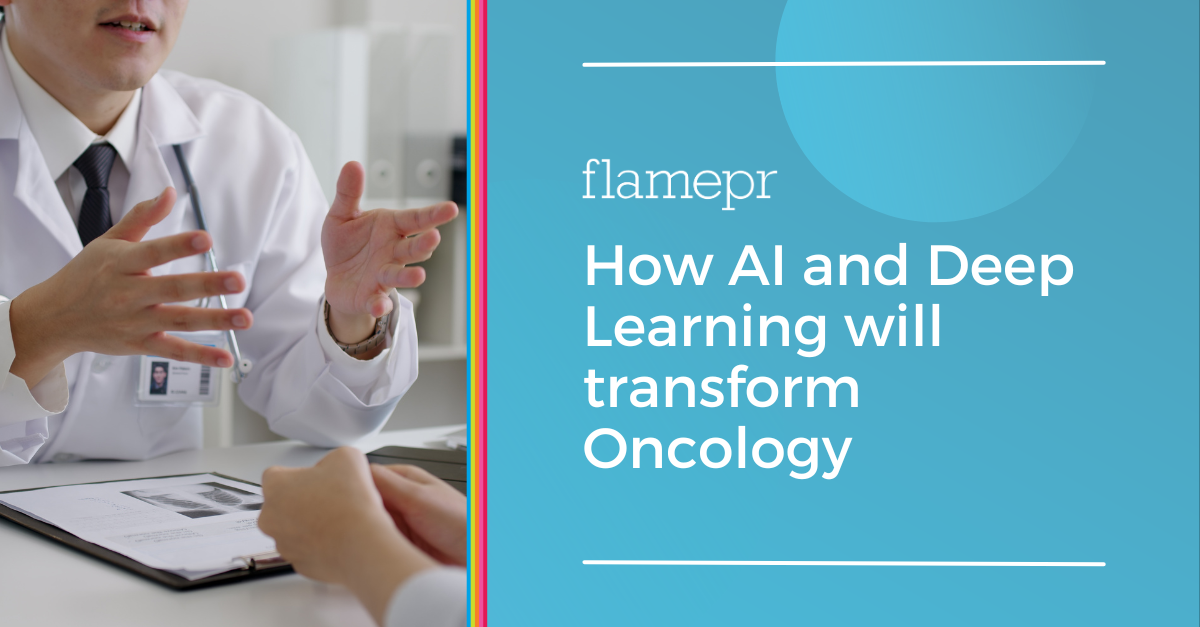|
By Harry Warne In the ever-evolving landscape of healthcare, one of the most profound advancements of recent years has been the integration of Artificial Intelligence (AI). Deep learning, a subfield of AI that is highly flexible, is being applied in multiple areas of both basic and clinical cancer research[i]. AI and Deep Learning in OncologyAI has emerged as a revolutionary tool in many different therapy areas, and particularly in the field of oncology, offering unprecedented opportunities to enhance patient care, optimize treatment strategies, and revolutionize clinical decision-making processes. As the healthcare industry navigates through the complexities of cancer diagnosis, treatment, and management, AI is becoming increasingly indispensable. This article aims to explore the profound impact of AI in oncology and its broader implications for the healthcare sector globally. How AI is being used in OncologyAI is being integrated into various areas of oncology, ranging from early detection and diagnosis to treatment planning and personalized medicine. Advanced machine learning algorithms analyse vast amounts of medical data, including imaging scans, genomic profiles, pathology reports, and patient records, to identify patterns, predict outcomes, and assist clinicians in making informed decisions. For example, deep learning algorithms are capable of interpreting radiological images such as MRI, CT scans, and mammograms, facilitating early detection of tumours and abnormalities with high accuracy[i]. Additionally, AI-powered tools can analyse genomic data to identify genetic mutations associated with specific cancer types, enabling tailored treatment approaches and precision medicine interventions[ii]. Does Global Oncology need AI? The need for AI in oncology stems from the complexities inherent in cancer diagnosis and treatment, as cancer is the most common cause of death in developed countries, with this stat due to grow alongside ageing populations[i]. Traditional methods often rely on manual interpretation of medical images and labour-intensive analysis of patient data, which can be time-consuming, subjective, and prone to human error[ii]. Deep learning is used to perform these tasks and has done so with great success already[iii]. The rapid growth of healthcare data presents challenges in extracting actionable insights and delivering personalized care efficiently. By leveraging AI and deep learning, healthcare providers can harness the power of automation, data-driven insights, and predictive analytics to streamline workflows, improve diagnostic accuracy, and optimize treatment outcomes. In an era characterized by the pursuit of accurate precision medicine and patient-centric care, AI serves as a catalyst for innovation and transformation in oncology practice. How has AI helped Clinicians and Healthcare Professionals? The integration of AI in oncology has yielded numerous benefits for clinicians and healthcare professionals (HCPs), enhancing their ability to deliver high-quality care and optimize resource utilization[i]. AI-powered diagnostic tools increase clinical decision-making by providing timely insights and actionable recommendations, thereby reducing diagnostic errors and improving patient outcomes[ii]. Furthermore, AI-driven predictive models enable risk grading, treatment response prediction, and prognosis assessment, empowering clinicians to tailor treatment procedures based on individual patient characteristics and disease trajectories. AI’s ability to automate routine tasks such as data analysis and documentation, frees clinicians from administrative burdens, allowing them to focus on patient care and complex clinical scenarios. What are the limitations of AI in Oncology? Despite its transformative potential, the widespread adoption of AI in oncology requires careful consideration of various ethical, regulatory, and practical considerations. Privacy concerns surrounding patient data security and confidentiality must be addressed through robust data governance frameworks and adherence to regulatory guidelines such as the U.S. Department of Health and Human Services’ HIPAA (Health Insurance Portability and Accountability Act). The implementation of AI algorithms requires careful validation, ongoing monitoring, and continuous refinement to ensure accuracy, reliability, and clinical relevance. AI systems are sometimes expensive to set up and then run, with HCPs and Clinicians often requiring training to use the systems[i][ii]. Collaborative efforts between clinicians, data scientists, and healthcare stakeholders are essential to develop AI solutions that align with clinical workflows, address unmet needs, and integrate seamlessly into existing healthcare systems. AI represents a model shift in oncology, offering unprecedented opportunities to enhance patient care, empower clinicians, and optimize healthcare delivery. By harnessing the power of AI-driven technologies, the healthcare industry can unlock new doors in cancer diagnosis, treatment, and management, ultimately transforming the way we approach oncology care going forwards. If you’d like some guidance on reaching the right audience within the healthcare sector, please do get in touch. Email: [email protected], or call us on 020 3357 9740 [1] Shimizu H, Nakayama KI. Artificial intelligence in oncology. Cancer Sci. 2020;111:1452–1460.
[2] Teare P, Fishman M, Benzaquen O, Toledano E, Elnekave E. Malignancy detection on mammography using dual deep convolutional neural networks and genetically discovered false color input enhancement. J Digit Imaging. 2017;30:499-505. [3] Chen H, Engkvist O, Wang Y, Olivecrona M, Blaschke T. The rise of deep learning in drug discovery. Drug Discov Today. 2018;23:1241-1250. [4] Siegel RL, Miller KD, Jemal A. Cancer statistics, 2019. CA Cancer J Clin. 2019;69:7-34. [5] Jiang F et al. Artificial intelligence in healthcare: past, present and future. Stroke Vasc Neurol 2017;2(4):230–43. [6] Litjens G, Sanchez CI, Timofeeva N, et al. Deep learning as a tool for increased accuracy and efficiency of histopathological diagnosis. Sci Rep. 2016;6:26286. [7] Amisha, P. Malik, M. Pathania, and V. K. Rathaur, ‘‘Overview of artificial intelligence in medicine,” J Family Med Prim Care, vol. 8, no. 7, pp. 2328- 2331, Jul 2019. [8] Joshi AV. Machine Learning and Artificial Intelligence. Springer Nature Switzerland; 2020 [9] Tizhoosh HR, Pantanowitz L. Artificial Intelligence and Digital Pathology: Challenges and Opportunities. J Pathol Inform 2018;9:38. [10] C. J. Kelly, A. Karthikesalingam, M. Suleyman, G. Corrado, and D. King, ‘‘Key challenges for delivering clinical impact with artificial intelligence,” BMC Med, vol. 17, no. 1, p. 195, Oct 29 2019.
0 Comments
Your comment will be posted after it is approved.
Leave a Reply. |
Blog Archives:
June 2024
|

